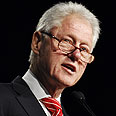
Bill Clinton speaks out against nuclear Iran
Former US president tells CNN nuclear Iran is 'too dangerous,' but sees no reason to prevent Israel from developing nukes as 'it does not support terrorism'
Clinton told CNN's Piers Morgan that Iran "is a government with a record of supporting terror and if they had nuclear weapon, it would be (too dangerous), even if you believe they never use it." The former president added that even if Iran's use of a nuclear weapon would eventually lead to its own destruction, there would still be dire ramifications to a nuclear Iran.
Related stories:
- Obama: We'll do what we must to prevent nuclear Iran
- Obama says 'blocking out' Israeli 'noise'
- Ahmadinejad: Iran threatened by 'uncivilized Zionists'
"A lot of their neighbors will get bombed," he stated, "and the more of these weapons you have hanging around, the more fissile material you've got, the more they're vulnerable to being stolen or sold or just simply transferred to terrorists," he said.
Clinton added that "Iran has all these extensive contacts with terrorist groups and even if the government didn't directly sanction it, it wouldn't be that much trouble to be – to get a Girl Scout cookie's worth of fissile material, which, if put in the same fertilizer bomb Timothy McVeigh used in Oklahoma City, is enough to take out 20 to 25 percent of Washington, DC Just that little bit."
"So the prospect of spreading, in a way, dirty nuclear bombs with smaller payloads that could wreak havoc and do untold damage, goes up exponentially every time some new country gets this capacity. And you don't have any control over what happens to the fissile material," he added.
Against the backdrop of diplomatic tension between Israel and the US on the issue of a nuclear Iran, Clinton clarified that in his opinion, "the smart thing for us to do is to maintain constant (contact) with the Israeli intelligence services and the Arab intelligence services, who also don't want Iran to have a nuclear weapon. The Gulf states don't want to have to decide to acquire a nuclear weapon. They don't want an arms race in the Middle East."
Clinton also urged the international community to force Iranian President Mahmoud Ahmadinejad to allow impartial inspectors to corroborate his claims that his country's nuclear program "has peaceful intentions."
"What they're really saying is in spite of the fact that we deny the Holocaust, that we threaten Israel and we demonize the United States, we want you to trust us. In spite of the fact that we won't cooperate with the international regime set up to avoid an arms race in the Middle East and set up to avoid nuclear proliferation, we want you to trust us," Clinton asserted. "They don't have a tenable position".
When asked what America's response should be in case Israel was to launch a preemptive strike, Clinton responded: "I shouldn't answer that question because of my wife's position and that's the president and the security team's decision to make. But I generally have confidence with what they said and how they tried to explain it to the American people."
In regards to the 'red line' issue, which is at the core of the dispute between Prime Minister Benjamin Netanyahu and President Barack Obama, Clinton said that "Ahmadinejad certainly knows that we have not picked this fight. We have not gone out of our way to get into a military confrontation, but we have made some very clear red lines there."
Obama, who gave his speech at the UN General Assembly earlier on Tuesday, said that the US would do what it must in order to prevent Iran from obtaining nuclear power. "America wants to resolve this issue through diplomacy, and we believe that there is still time and space to do so. But that time is not unlimited, Obama said. "We respect the right of nations to access peaceful nuclear power, but make no mistake: A nuclear-armed Iran is not a challenge that can be contained."
Obama's speech also did not include any ultimatums for Iran, despite the fact that Netanyahu demanded that 'red lines' be established. But the White House made it clear that no such move would be made.
In a recent CBS interview, Obama described the Israeli pressure to draw a "red line" for Iran as "noise" he was trying to block out. He remarked that as far as US national security was concerned, "any pressure that I feel is simply to do what's right for the American people. And I am going to block out any noise that's out there."
- Receive Ynetnews updates directly to your desktop










